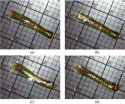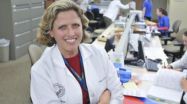(Press-News.org) Next time you spot an earthworm sliding through fresh dirt, take a closer look. What you're seeing is an organic movement called peristaltic locomotion that has been meticulously refined by nature.
Jarod Gregory, an undergraduate student in the University of Cincinnati's College of Engineering and Applied Science, used a worm's contracting and expanding motion to provide a way for gels to swim in water. This is a product of work by the interdisciplinary team consisting of Jarod Gregory, a chemical engineering major, and his two advisers, Lilit Yeghiazarian, assistant professor of environmental engineering, and Vasile Nistor, assistant professor of biomedical engineering.
Phase one of his research titled, "Remote-Controlled Peristaltic Locomotion in Free-Floating PNIPAM Hydrogels," is published in the Journal of Applied Polymer Science.
Published research is always an accomplishment within the world of academia, but it is especially significant when the primary author is an undergraduate student at the time of his research. Gregory is an ACCEND (ACCelerated ENgineering Degree) student who has just transitioned directly into UC's doctoral program in environmental engineering last month after earning a bachelor's of science in chemical engineering. This not-so-common achievement as an undergrad points to the significance of Gregory's research, also recognized by this year's Goldwater Award.
When earthworms use peristaltic locomotion they engage with a surface, propel forward and detach. Gregory explains that peristaltic motion has previously been used by the team as a mechanism for movement for gels in frictional environments such as on solid ground or inside a tube. With Gregory's research, soft materials now have the ability to move freely without requiring outside friction, by using shrinking and swelling to move the center of gravity of an object in water - vastly expanding potential applications of soft materials and soon, soft robots.
Gregory explains, "Using a hand-held laser, we were able to selectively and quickly shrink the hydrogel (a hydrophilic polymer gel comprised mostly of water) in desired areas. By inducing a shrinking/swelling cycle down the length of a hydrogel, we were able to successfully mimic peristaltic, or earthworm-inspired, locomotion in water."
According to Gregory, "Studies have shown that hydrogels can be equipped to detect bacteria, carry cargo and deliver medicine. This new method of mobility expands the hydrogel's use as an environmental and biotechnological tool by allowing them to explore new areas such as surface waters to combat toxic elements, or cavities inside the human body."
INFORMATION:
This research project started by Jarod Gregory with assistant professors Lilit Yeghiazarian and Vasile Nistor of the Department of Biomedical, Chemical, and Environmental Engineering in January of 2013 is a National Science Foundation-supported project. It was also a part of the NSF Research Experience for Undergraduates program at the University of Cincinnati for the 2013-14 academic year.
As Jarod Gregory continues into the next phase of his research, the world of soft materials is sure to reap the benefits.
For more information about the UC College of Engineering and Applied Science, please visit: http://ceas.uc.edu
For more information about ongoing research at UC CEAS, please visit: http://ceas.uc.edu/research/research_overviewbydept.html
New method of wormlike motion lets gels wiggle through water
A prestigious journal published a UC undergraduate's research on hydrogels a special substance that can be equipped to detect bacteria, carry cargo and deliver medicine
2014-05-30
ELSE PRESS RELEASES FROM THIS DATE:
New drug treatment helps prevent early menopause in breast cancer patients
2014-05-30
MAYWOOD, Ill. (May 30, 2014) – Among young women treated for breast cancer, one of the most distressing side effects of chemotherapy is early menopause. But a major clinical trial has found that the risk of early menopause can be significantly reduced by adding a drug called goserelin to the chemotherapy regimen. Also, women who took goserelin and wanted to have children were more likely to get pregnant and deliver a healthy baby.
Results were released during the 2014 American Society of Clinical Oncology 50th Annual Meeting in Chicago. Kathy Albain, MD, of Loyola University ...
Stopping statins may benefit terminally ill patients
2014-05-30
Results presented today at the 50th Annual Meeting of the American Society for Clinical Oncology (ASCO) and June 6 at the European Association of Palliative Care Research Conference show that stopping statins for cholesterol management in the late stages of cancer or other terminal illnesses may offer quality-of-life and even life-extending benefits. The results highlight the larger question of when, if ever, it is appropriate in patients with life-limiting illnesses to discontinue medications prescribed for other conditions that will likely not lead to their death.
Researchers ...
Women with metastatic breast cancer can safely receive bisphosphonates less frequently, without comp
2014-05-30
CHICAGO – Women with metastatic breast cancer to the bone may be able to receive bisphosphonates, the bone-targeting class of drugs like zoledronic acid, less often after the first year of monthly administration. With that practice change, women may also reduce their risk of serious side effects, according to a study led by researchers at The University of Texas MD Anderson Cancer Center.
The research was presented today on the press program of the American Society of Clinical Oncology 2014 Annual Meeting by MD Anderson's Gabriel Hortobagyi, MD, professor, Breast Medical ...
Phase I study of DMOT4039A in patients with pancreatic or ovarian cancer
2014-05-30
A study presented at the 50th Annual Meeting of the American Society for Clinical Oncology (ASCO) describes the results of a phase I clinical trial of the investigational agent DMOT4039A against pancreatic and ovarian cancers. In this early clinical trial with the goal of identifying possible risks and defining likely dosages, the drug was well tolerated and in some patients showed initial evidence of anti-cancer activity.
The drug is in fact a combination of a chemotherapeutic agent with an antibody, technically called an antibody-drug conjugate (ADC). Just as cells ...
Genetic profile predicts which bladder cancer patients will benefit from early chemotherapy
2014-05-30
CHICAGO, IL (May 30, 2014)—Three genetic changes can predict whether a patient will benefit from chemotherapy before surgery to remove bladder cancer, according to new findings presented by Fox Chase Cancer Center researchers during the 50th Annual Meeting of the American Society of Clinical Oncology.
During the study, 36 patients with muscle-invasive bladder cancer received chemotherapy before surgery, consisting of an accelerated regimen of methotrexate, vinblastine, doxorubicin, and cisplatin (AMVAC). By the time surgery rolled around, 14 patients appeared cancer-free. ...
For the first time in the lab, researchers see stem cells take key step toward development
2014-05-30
CHAMPAIGN, Ill. — The gap between stem cell research and regenerative medicine just became a lot narrower, thanks to a new technique that coaxes stem cells, with potential to become any tissue type, to take the first step to specialization. It is the first time this critical step has been demonstrated in a laboratory.
University of Illinois researchers, in collaboration with scientists at Notre Dame University and the Huazhong University of Science and Technology in China, published their results in the journal Nature Communications.
"Everybody knows that for an embryo ...
Trial uncovers potential dangers of chemotherapy regimen for bladder cancer patients
2014-05-30
CHICAGO, IL (May 30, 2014)—Patients with muscle-invasive bladder cancer often benefit from chemotherapy before surgery to remove the tumor, but a test of one regimen by researchers at Fox Chase Cancer Center was halted when too many people experienced serious side effects such as heart attacks and blood clots in the legs and lungs.
All of the 31 patients included in the study received a combination of gemcitabine and cisplatin, two drugs normally administered for 12 weeks before surgery to remove the tumors. This became the standard of care after one study looked back, ...
Atomic structure of essential circadian clock protein complex determined
2014-05-30
Structural biologists have made important progress towards better understanding the functioning of the circadian clock. The circadian or inner clock coordinates the sleep-wake rhythm and many other body processes that regulate, for example, metabolism, blood pressure, and the immune system. A research team led by Professor Eva Wolf, recently appointed Professor of Structural Biology at the Institute of General Botany of Johannes Gutenberg University Mainz (JGU) and Adjunct Director at the Institute of Molecular Biology (IMB), has for the first time identified the molecular ...
Coaxing iPS cells to become more specialized prior to transplantation cuts rejection risk
2014-05-30
STANFORD, Calif. — For many scientists, the clinical promise of stem cells has been dampened by very real concerns that the immune system will reject the transplanted cells before they could render any long-term benefit. Previous research in mice has suggested that even stem cells produced from the subject's own tissue, called iPS cells, can trigger an immune attack.
Now researchers at the Stanford University School of Medicine have found that coaxing iPS cells in the laboratory to become more-specialized progeny cells (a cellular process called differentiation) before ...
Standard approaches to menopause symptoms discount non-Western experiences
2014-05-30
Dr Mwenza T. Blell of the University of Bristol interviewed 257 British Pakistani women aged 39-61 living in West Yorkshire and found that the standard checklist approach to studying menopause symptoms, which ignores women's understanding of their own experience, leaves researchers and clinicians with gaps in their knowledge of the 'true' symptoms of menopause.
Many previous studies into the menopause have relied on standardised checklists, such as the Blatt-Kupperman index and the Menopause Symptom Checklist, that were derived from the clinical experiences of women living ...
LAST 30 PRESS RELEASES:
Scientists discover why we know when to stop scratching an itch
A hidden reason inner ear cells die – and what it means for preventing hearing loss
Researchers discover how tuberculosis bacteria use a “stealth” mechanism to evade the immune system
New microscopy technique lets scientists see cells in unprecedented detail and color
Sometimes less is more: Scientists rethink how to pack medicine into tiny delivery capsules
Scientists build low-cost microscope to study living cells in zero gravity
The Biophysical Journal names Denis V. Titov the 2025 Paper of the Year-Early Career Investigator awardee
Scientists show how your body senses cold—and why menthol feels cool
Scientists deliver new molecule for getting DNA into cells
Study reveals insights about brain regions linked to OCD, informing potential treatments
Does ocean saltiness influence El Niño?
2026 Young Investigators: ONR celebrates new talent tackling warfighter challenges
Genetics help explain who gets the ‘telltale tingle’ from music, art and literature
Many Americans misunderstand medical aid in dying laws
Researchers publish landmark infectious disease study in ‘Science’
New NSF award supports innovative role-playing game approach to strengthening research security in academia
Kumar named to ACMA Emerging Leaders Program for 2026
AI language models could transform aquatic environmental risk assessment
New isotope tools reveal hidden pathways reshaping the global nitrogen cycle
Study reveals how antibiotic structure controls removal from water using biochar
Why chronic pain lasts longer in women: Immune cells offer clues
Toxic exposure creates epigenetic disease risk over 20 generations
More time spent on social media linked to steroid use intentions among boys and men
New study suggests a “kick it while it’s down” approach to cancer treatment could improve cure rates
Milken Institute, Ann Theodore Foundation launch new grant to support clinical trial for potential sarcoidosis treatment
New strategies boost effectiveness of CAR-NK therapy against cancer
Study: Adolescent cannabis use linked to doubling risk of psychotic and bipolar disorders
Invisible harms: drug-related deaths spike after hurricanes and tropical storms
Adolescent cannabis use and risk of psychotic, bipolar, depressive, and anxiety disorders
Anxiety, depression, and care barriers in adults with intellectual and developmental disabilities
[Press-News.org] New method of wormlike motion lets gels wiggle through waterA prestigious journal published a UC undergraduate's research on hydrogels a special substance that can be equipped to detect bacteria, carry cargo and deliver medicine



